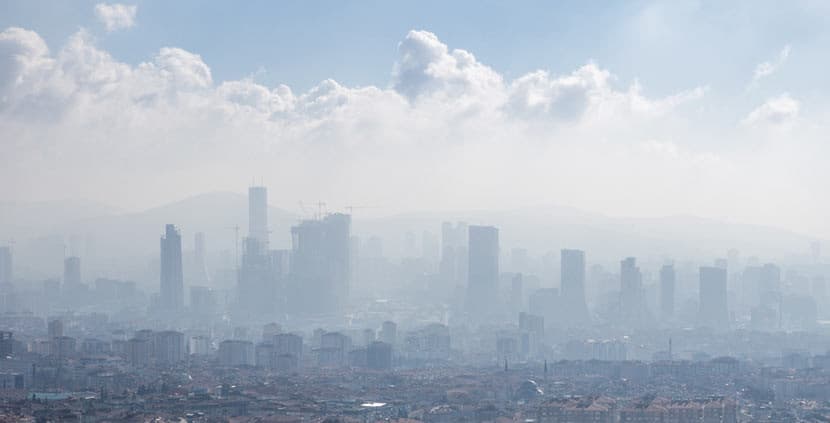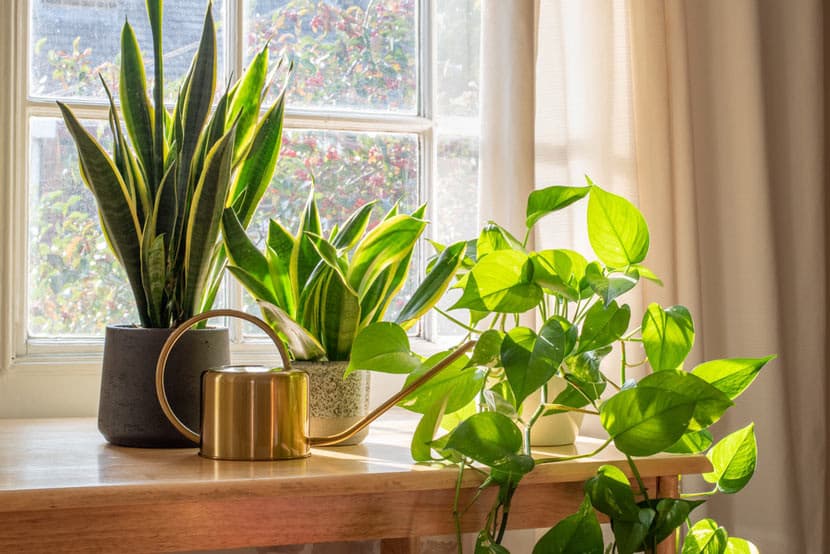Breathe Fresh Air!
Article by:
Amazing Discoveries™ |
12 min read
Air is the most important element of life for humans. A person could survive weeks without food and days without water, but deprived of air, you would perish within minutes.
Oxygen
Every day you breathe about 22,000 times.1 Each one of your cells needs a constant supply of oxygen. When you breathe in, oxygen is taken into your body and diffused into the blood through the lung alveoli. The oxygen-enriched blood is carried to each part of the body, supplying the trillions of cells2 with oxygen. Oxygen gives our cells the ability to break down food in order to release the energy we need to survive. Without oxygen our cells cannot do this. The carbon dioxide that has been generated during this process diffuses back into the blood and is taken to the lungs. It is then expelled from the body when we breathe out. This process is so automatic that people rarely think about it.

Photo via Unsplash
Having enough oxygen in your blood is important for good health. However, breathing polluted air or developing certain health conditions can prevent you from getting the oxygen you need. This causes low blood oxygen. Having low blood oxygen can make you feel physically ill, and can seriously interfere with your body’s function,3 including loss of consciousness. If low blood oxygen is a concern for you, there are things you can do to improve your blood oxygen levels.
Benefits of getting enough oxygen include improved sleep,4 improved mood, and better brain function.5
The air you breathe can positively or negatively impact your health. Even though you breathe without thinking, it’s important to think about how and what you breathe.
Air Quality
Lifestyle educator Walt Cross says that for optimal health, it’s best to breathe fresh air. This is outdoor air which is free of smog and pollutants. Fresh air is rich in oxygen and is full of negative ions. Negative ions6 carry more oxygen and have been called the “vitamins of air”. They are odorless and tasteless invisible molecules that we inhale when we breathe. Negative ions can be anywhere where there is fresh air, but they are primarily found in the mountains, around waterfalls, beaches, and forests, and after heavy rain. There are believed to be several health benefits of breathing air charged with negative ions.
Unfortunately, pollution causes air to lose these benefits. Air can become contaminated with pollutants such as particulate matter, traffic emissions, agricultural chemicals, carbon monoxide, off gasses from home and office furniture,7 and the byproducts of energy production.

Pollution can cause a variety of side effects, including respiratory irritation,8 infertility and other reproductive issues,9 and increased risk of asthma in children.10 Researchers are also investigating the effects of air pollution on the immune system.11
Indoor Air
The chemical makeup of fresh outdoor air differs from that of indoor air. All air particles have an electrical charge. Fresh air is negatively charged. When air enters a building or vehicle it can become positively charged.12 Factors such as pollution, chemicals, or even pollen can give air molecules a positive charge.13 Positive air charges are known as positive ions.
It’s not just external factors such as pollution that can cause positive ions. Electronic devices such as televisions, phones and computers, fluorescent lighting, carpeting, upholstery, and paint can also generate positive ions. Higher levels of positive ions in the environment may cause a variety of symptoms and illnesses. Although more peer-reviewed research needs to be done on the effects of positive and negative ions, there is an undisputed difference between indoor and fresh outdoor air quality.
Did you know that the majority of Americans spend 90% of their time inside?14 If you spend most of your time indoors, you are probably breathing recycled air. Recycled air contains little oxygen and large amounts of carbon dioxide. In addition to being recycled, indoor air contains contaminants such as mold, particulate matter from cooking, and off gasses from furniture and building products. Breathing poor-quality indoor air can trigger headaches, respiratory discomfort, and even skin irritation.15
Researchers are looking into the impact of air quality in workspaces. A Harvard study found that pollution and poor ventilation within workplaces can have a negative effect on employee performance and brain function.16
If you are someone who spends most of your time indoors, don’t panic! There are things you can do to improve the air quality of your environment.

Air purifiers or certain houseplants may help with indoor air filtration. You could also consider purchasing a negative ion generator. While negative ion generators don’t clean the air, they release negative ions which can help you feel happier17 and more alert.
Don’t allow indoor smoking and minimize use of or remove pollutants such as air fresheners. While many people think that air fresheners improve the air quality by masking odors, these products can be harmful because they release chemicals into the air.
A study found that use of air fresheners can cause the release of known air pollutants, and that exposure to certain components frequently found in air fresheners can cause health issues.18 The CDC lists air fresheners with other chemical contaminants such as paint and fuel. Air fresheners contain multiple chemicals, many of them posing health hazards.19
Remain conscious about the type and amount of cleaning products you use in your home or workplace as some cleaning products emit harmful by-products, or have the ability to cause chemical reactions which contribute to lower indoor air quality.20
In addition to these practices, one of the best ways to improve indoor air quality and breathe fresh air while indoors is to increase ventilation.
Ventilation
Because current building standards focus on energy efficiency or, in colder climates, heat retention, modern buildings are often poorly ventilated. Controlled air systems and windows that are designed to remain closed contribute to a lack of fresh air in living spaces.
Even if you have an opening window, you must ensure that air moves throughout the room to improve the air quality. Since air is a substance that doesn’t move on its own, there must be something to encourage circulation. Opening multiple windows and doors or turning on an exhaust fan can help increase the airflow in a space and replace recycled air with fresh air. However, always be aware of the air quality outside your home – bringing polluted air into your home is not beneficial.

Properly ventilating your home can improve air quality. It can also help you feel and sleep better. A study measured the effects of sleeping in a ventilated room. The study found that participants who slept in a room that was ventilated experienced better sleep quality and had an improved overall feeling the next morning. Study participants who had slept in a ventilated room had improved concentration and performed better on a test which measured logical thinking the following morning.21
Improving ventilation will positively affect the quality of the air you breathe but you need to be sure you are breathing properly in order to take full advantage of the air.
Proper Breathing
The way you sit or stand will affect the amount of air your lungs are able to take in and hold.22 When you have good posture, you breathe better.23 Improving the lungs’ capacity allows you to intake and retain higher amounts of oxygen which is essential for optimal health. Not getting enough oxygen has a negative effect on your cells and can even have a taxing effect on the heart.

Exercise makes you breathe deeply and may help increase the heart’s ability to send more oxygen throughout the body.24 Outdoor exercise in fresh air is optimal.
Your clothing choices can affect your breathing, so it’s important to be conscious about what you wear. Tight clothing is restrictive and doesn’t allow your lungs to fully inflate. Looser clothing gives your body the space it needs to take in air.
Hydration
Since the lungs are one of the areas where we experience continual water loss with every breath, not drinking enough water can restrict the body’s ability to resolve issues such as asthma, mucus in the lungs, COPD, or other lung issues.

In his book Your Body’s Many Cries for Water,25 Dr. Batmanghelidj writes extensively on the connection between water and asthma. He explains that histamine regulates the bronchial muscles in the lungs, and when the histamine content is higher, such as in asthmatics, “bronchial constriction produced by histamine means less water evaporation during the act of breathing - a simple natural manoeuvre to preserve the body's water.” (Batmanghelidj 2001, 107) This is a sign of dehydration. When water intake is increased, histamine is decreased.
Water is needed in the lungs to keep the air passages moist and prevent them from drying up when air goes in and comes out. In dehydration, mucus secretion protects air passages from drying. In the first stages of asthma, mucus is secreted to protect the tissues. There comes a time when much mucus is secreted and it stays put, preventing normal passage of air through the airways. Sodium is a natural mucus breaker, and it is normally secreted to make mucus 'disposable'. That is why phlegm tastes salty when it comes in contact with the tongue. Salt is needed to break up the mucus in the lungs and render it watery for its expulsion from the airways. In dehydration, and in conjunction with water preservation mechanisms, a simultaneous and associated salt-preservation programme is established. Not losing salt to mucus secretion becomes part of the programme.The body needs to be assured that both water and salt are available before bronchial constriction relaxes and mucus becomes loose enough to be secreted.26
Staying well hydrated will help your lungs work better, especially if you suffer from something like asthma27 or COPD. When you drink enough water, the mucosal lining of your lungs remains thin which helps you breathe easier.28
Deep Breathing
Besides improving your posture and exercising regularly, you can try deep breathing to increase oxygen,29 help you breathe more efficiently, and relieve stress and anxiety.
Try this simple deep breathing exercise that only takes a few minutes.
1 |
Find fresh air- outdoors is best.
|
2 |
Stand straight and tall.
|
3 |
Breathe deeply. Draw as much air into your lungs as they will hold. Imagine it going right down into your belly. Feel your stomach expand.
|
4 |
Hold your breath for a few seconds.
|
5 |
Empty your lungs as completely as possible; use your stomach muscles to gently push out the last bit of air.
|
6 |
Repeat the process five or six times.
|
Doing this a few times a day is optimal. By consciously filling your lungs to capacity each day you will begin to breathe better. Watch a video on how to breathe deeply here.
How and what you breathe can have a profound effect on your health. Being conscious about the quality of air you breathe and how well you breathe is essential for optimal health. If you are not breathing properly or the quality of air in your environment is poor, do what you can to improve the situation. Then start enjoying better-quality sleep and other overall health improvements.
Related Articles
These statements have not been evaluated by the Food and Drug Administration or Health Canada. Our articles, videos and products are not intended to diagnose, treat, cure, or prevent any disease. If you are pregnant, nursing, taking medication, or have a medical condition, consult your physician before following any recommendations or using any product on our site. You assume sole responsibility for your personal health, and you must use your own discretion under doctor consultation to determine whether any product or recommendation on this site is suitable for your personal situation.




